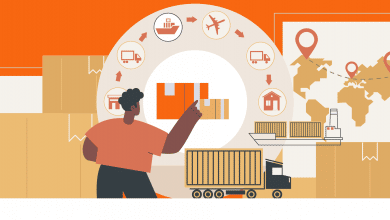Amazon Accelerator Program Review 2024

This article contains affiliate links that will allow us to earn commissions without any extra cost to you. Read our full disclosure here.
The Amazon Accelerator Program is designed to help startups and private label sellers grow their online brands by partnering with Amazon itself—but like with all things Amazon, it comes at a cost.
This Accelerator Program review will discuss the perks and drawbacks, and why it may not be ideal for all third-party Amazon sellers.
Related Listening: E344: 7 Hacks for New and Experienced Amazon Sellers
What Is Amazon Accelerator Program?
Amazon Accelerator is a program in which third-party sellers and manufacturers interested in selling their products under the Amazon brand can potentially become an “Amazon Private Brand supplier.” This basically means giving up a certain amount of control over your business to Amazon in exchange for marketplace incentives like onboarding support and marketing tools that help you scale your business faster.
Think of it as Amazon’s way of bypassing the research and development phase of an ecommerce business. Instead, it props up potentially profitable private label brands, has them sell exclusively on Amazon, and eventually acquires the “best-of-the-best” brands.
Of course, we know all too well that Amazon is both a marketplace AND a seller. Amazon itself sells products off hundreds of its own private label brands, and it looks like it wants to expand with more brands and into more categories.

As with Amazon Launchpad, the Amazon Accelerator Program gives some kind of unfair advantage to those who take part over other existing sellers. And since Amazon could end up owning the brands anyway (concrete example below), it seems like a way for the e-tail giant to squeeze out independent sellers off the platform, which is pretty unsurprising for Amazon, really.

OR 10% OFF Every Month When You Use Code: ECOMCREW10
Who Can Sign Up for Amazon Accelerator?
The Amazon Accelerator Program is ideal for established brands that could look good as part of Amazon’s growing portfolio. It makes the most sense if you have the facility to develop new products but require tools on the marketing front and have little to no brand equity.
Here are some of the bare essentials that Amazon will look at:
- You can generate at least $1M in annual sales
- Commit 5% of revenue to paid advertising on Amazon
- Maintain healthy inventory levels
- Adopt FBA, although Amazon allows brands to go use merchant-fulfilled models when inventory runs dry
The Amazon Black Business Accelerator Program
Amazon has a dedicated program to help Black-owned businesses scale and grow on the platform called the Black Business Accelerator.
Eligible sellers enjoy benefits, which include
Financial assistance
Business education and coaching
Advertising support
To take advantage of the program, you must have a certification for your Black-owned business (don’t worry if you don’t have this because Amazon partnered with SupplierGateway to help you create one).
How Much Does the Amazon Accelerator Program Cost?
Sellers who are accepted into the Amazon Accelerator Program will incur a program fee of a 7% premium to the referral fees found on the Amazon Fee Schedule.
If your products fall under Fashion categories (Clothing & Accessories, Shoes & Bags, Jewelry, Watches, Luggage), the fee for the program is an additional 7% premium to the referral fees described on the Selling on Amazon Fee Schedule for Clothing & Accessories regardless of which Fashion category product you sell.
Also, note that all brands under the Seller Central account you enroll into Accelerator will get charged the program fee.
What are the Pros and Cons of Amazon Accelerator?
In a nutshell, the Amazon Accelerator Program gives sellers short-term benefits, but potentially long-term drawbacks. Here are its main benefits and the pitfalls you should watch out for:
Amazon Accelerator Program Pros
- You get displayed more prominently. Accelerator does not have the curated marketplace that Launchpad has, but it does feature enrolled brands on Amazon’s Our Brands page.
- Reduced risk and more room to experiment. Since Amazon practically manages your business for you, you have more leeway to experiment with product variations and listings without driving your business into the ground.
- Marketing and support package. Similar to the marketing package under Launchpad. You get access to tools, analytics, and Amazon’s support team.
- Fewer logistical headaches. Amazon will take over the management of your supply chain (which is a con, if you think about it), so you have less worries when it comes to shipments and inventory management.
- Customer reviews. Both Launchpad and Accelerator provide you with free access to Amazon Vine to give your brand a leg up in terms of customer feedback.
- Office space. Amazon will apparently give you free access to their office spaces in Seattle.
Amazon Accelerator Program Cons
- You can kiss control over your brand goodbye. Accelerator functions more like a franchise to sell exclusively on and for Amazon rather than, well, an accelerator. Amazon will take control over your brand operations. Enrolled brands are given strict production timelines and will have to cede control over things like packaging to Amazon.
- No brand gating. Unlike with Launchpad, Amazon will not gate your product under Accelerator. Combine that with Amazon setting their own prices and always trying to win the Buy Box, you might as well kiss control over pricing goodbye, too.
- Selling on Amazon exclusively. In exchange for all the tools and support from Amazon, you will be limited to selling your products on Amazon ONLY. Forget about expanding to places like Walmart or eBay or even setting up your own ecommerce store (unless you're selling a totally different product under a different brand). This also makes it hard to diversify your revenue, since you cannot work with distributors and retailers not named Amazon.
- The dreaded purchase clause. According to some sellers, your contract with Amazon will contain a purchase clause that gives them the right to purchase the brand, interest, and goodwill, usually for a measly amount. This is a deal-breaker for most people.
- No access to customer data. Sellers also report that Amazon won’t actually give you the customer data in case you part ways with your brand and start anew on a different platform with different products. The customers are Amazon’s, not yours.
- You’re at the mercy of Amazon. Amazon has the right to kick you out of the program if it’s not working out for them. And if it does work out, they have the right to buy you out. So it’s a win-win—for Amazon.
From above, the biggest pro is the ability to experiment with various products and listing compositions without the risks that usually come with them. Also, since Amazon is very hands-on when you do sign up, you’ll benefit from the juggernaut’s fast shipping and streamlined inventory management.
Other benefits include the marketing package, support system, and additional placements, which make it far easier to grow a customer base on Amazon.
As for the downsides, you’re basically making products for Amazon in exchange for whatever short-term incentives you get. For a lot of sellers who were part of the program or at least looked into it at one point, it makes little sense to grow a brand only to give it up to Amazon for an unfair price. Keep this in mind when signing up to Accelerator.
Would you sell your business for $10,000?
In a 2019 report, The Wall Street Journal revealed the biggest ‘gotcha’ to Amazon Accelerator Program. Contracts between qualified merchants and Amazon apparently contain a clause that gives Amazon the right to purchase the right, title, and interest in your entire business at any time with a 60-day notice. The price? “Usually $10,000.” A measly ten thousand dollars. Yikes.
Also under the contract, you actually remain Amazon’s exclusive supplier for 2 years, after which Amazon can source products elsewhere. In other words, you can at least keep the patents, tweak the product, and sell new versions outside of Amazon, but they must not be under the same brand you enrolled in Accelerator.
Sounds like a total Faustian bargain, except you don’t get nearly as much as you would expect.
How Do I enroll in the Amazon Accelerator Program?
Interested sellers can enroll in the Amazon Accelerator Program through its dedicated landing page. From there, it’s a matter of clicking Sign Up and filling out their qualifying survey.
The survey consists of two parts: The first page is basic contact information where you will provide things like Company Name and other Contact Details. The second page will ask particulars about your business like what products you sell B2B or B2C, which Amazon marketplaces you’re interested to sell in, and where your factories or warehouses are located.
After filling out the qualifying survey, Amazon will evaluate and reach out to you for further steps in case you qualify. Turnaround time tends to vary, but a number of sellers mention receiving feedback within a couple of weeks.
Should I Sell Under Amazon Accelerator Program?
If you’re a private label brand or manufacturer (perhaps from China) whose focus is on production, Amazon Accelerator sounds like a nice way to partner up with Amazon. It also helps a lot if you're already a best seller or at least have a good sales record in your category. On the flip side, if you’re trying to grow a brand and establish a customer base on Amazon, the value exchange here tilts heavily to Amazon, and you might end up signing over your brand for much less than it’s worth.
However, if you’re in the heat of product development or are looking to jumpstart your innovative product, there’s another program called the Amazon Launchpad that could make more sense for your business. But you’ll have to consider your long-term goals, what with the 5% premium, 1-year lock-in contract, and much longer payment cycles.
The two programs cater to different kinds of brands, and the next section will show you the basic differences.
Amazon Accelerator Program vs. Amazon Launchpad
The table below shows a high-level comparison between Amazon Accelerator Program and Amazon Launchpad. While it does not list down all nuances between the two programs, it should give you an idea of which is more ideal depending on where you are in your ecommerce business cycle.
| Amazon Launchpad | Amazon Accelerator | |
|---|---|---|
| Intended for | Startups with innovative and marketable products | Private label brands and manufacturers willing to sell exclusively on Amazon |
| Additional exposure | Launchpad has its own dedicated marketplace within Amazon | No dedicated page, but Amazon may display your products prominently on the Our Brands section |
| Eligibility requirements |
|
|
| Cost to sellers | 5% premium added to referral fees (can be reduced to 3% if you exceed $1M in sales in your first 12 months) | 7% premium on the Referral Fees described on the Selling on Amazon Fee Schedule |
| Control | You retain brand control. Your products will be under your brand name, but you will lose all benefits once you opt-out. | Amazon practically takes over supply chain and operation, almost to the point that you are a nameless franchisee |
| Brand gating | Yes. Amazon will prevent unauthorized sellers from selling the same products | No |
Final Thoughts
The Amazon Accelerator Program (and the Launchpad program for newer brands) provides short-term benefits to third-party sellers, but it has long-term downsides that could materially change your business—the biggest of which is ceding control over a chunk of your business to Amazon.
If you can grind it out yourself until you get that flywheel going, while maintaining control over your business until you actually decide to sell on your terms, that’s a great way to go as well. That being said, if you’re a seller or manufacturer with tons of experience in product development but have little to no brand equity and are willing to tie your business with Amazon, then the Amazon Accelerator could give you a solid boost.
What do you think of Amazon’s Launchpad and Accelerator programs? Leave a comment below!




Amazon Accelerator is really only a viable model for factories who are just getting into e-commerce and have no existing brand equity. For anyone else, it is nuts
Completely agree.
This is a really awesome and helpful article for me. I really appreciate your work for providing such useful information, thank you so much!
Glad to hear it is helpful!